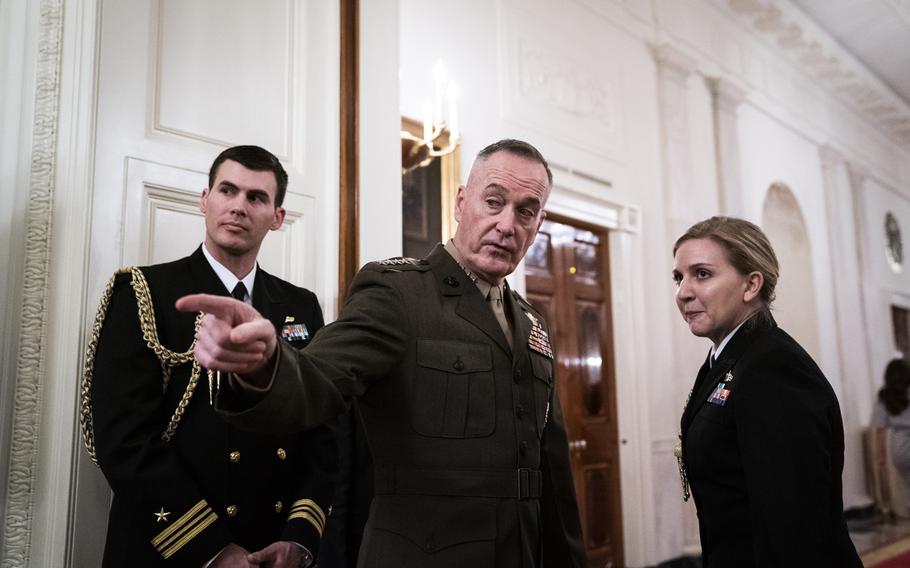MISSY RYAN

More than 80% of four-star officers retiring from the U.S. armed forces go on to work in the defense industry, a new study has found, underscoring the close relationship between top U.S. brass and government-contracted companies that has drawn scrutiny on Capitol Hill.
Twenty-six of 32 four-star admirals and generals who retired from June 2018 to July 2023 were later employed in roles including executive, adviser, board member or lobbyist for companies with significant defense business, according to the analysis from the Quincy Institute for Responsible Statecraft, a think tank that advocates for restraining the military’s role in U.S. foreign policy.
“The revolving door between the U.S. government and the arms industry, which involves hundreds of senior Pentagon officials and military officers every year, generates the appearance — and in some cases the reality — of conflicts of interest in the making of defense policy and in the shaping of the size and composition of the Pentagon budget,” authors William Hartung and Dillon Fisher wrote in the report, a copy of which was obtained by The Washington Post before its publication.
The analysis includes former officers employed by consulting firms with clients in the defense industry and financial firms with significant investments in that sector. Many of the employers cited in the report also have nondefense business interests.
The findings shed new light on a phenomenon examined in a 2021 report from the Government Accountability Office, which found that 14 major defense contractors, mostly weapons companies, employed 1,700 former senior officials or acquisition officials in 2019.
The GAO concluded that while defense contractors benefit from the practice, it could “affect public confidence in the government” by creating a perception that military officials may favor a company they see as a future employer.
A separate pattern was documented in a 2022 Washington Post investigation that explored the lucrative business deals hundreds of former military officers have conducted with foreign governments.
While former Pentagon officials face some restrictions on post-government employment, they are not prohibited from working for weapons or defense companies.
The Quincy Institute’s findings come as some in Congress seek to impose additional constraints, including a longer cooling-off period before senior officials can be employed by certain contractors and tighter rules for employment by foreign governments.
A report this year issued by Sen. Elizabeth Warren (D-Mass.) showed that, last year, Boeing, Lockheed Martin, General Dynamics and Raytheon were among the companies that employed lobbyists who once served as senior military officials, lawmakers or congressional staffers. Warren has argued that such relationships warrant closer scrutiny because of the scale of the Pentagon’s business with defense companies: The Defense Department accounted for some 60% of all federal government contracts in 2021, according to Warren’s report.
A Senate proposal from Warren, along with a parallel House bill from Rep. Andy Kim (D-N.J.), would prohibit former top officials from working for big defense companies within the first four years after they leave the military and ban sitting officials from holding stock in companies that receive more than $100 million in Pentagon contracts.
Warren, in a statement to The Post this week, said that some officials, including Defense Secretary Lloyd Austin, had made public pledges not to work for the defense industry after leaving the Pentagon. “The revolving door between the Pentagon and the defense industry severely undermines public confidence and our national security,” she said.
The Quincy Institute found that patterns of post-government employment for four-star officers have evolved over time, in that retirees are often now employed with startups or companies that finance arms manufacturers in addition to traditional large defense contractors.
Former four-stars cited in the report include Gen. Joseph F. Dunford Jr., who became a Lockheed Martin board member after stepping down as chairman of the Joint Chiefs of Staff, and Gen. Terrence O’Shaughnessy, who became a senior adviser at SpaceX — which launches military satellites as part of its business — after retiring from his post leading the U.S. Northern Command.
The report’s authors make their own recommendations, including a full ban on former four-stars’ employment with companies that receive $1 billion a year or more in Pentagon contracts; the expansion of required disclosures by companies that hire former officials; and expanding the definition of what activities qualify as lobbying.
The Quincy Institute’s supporters include the Ford Foundation, the Rockefeller Brothers Fund and the Open Society Foundations.
No comments:
Post a Comment